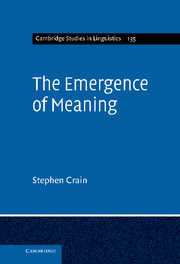Book contents
1 - Logic and human languages
Published online by Cambridge University Press: 05 November 2012
Summary
Introduction
For thousands of years, everyone believed that the human mind was logical. This was so obvious that no one thought to question it, or to verify it. Forty years ago some scientists decided to investigate, and they found that people failed some simple tests of logical reasoning. Scientists concluded that our minds use rules that conflict with logic. New models of human reasoning have flourished, with a common theme – that human languages and classical logic involve different basic concepts, and different principles of interpretation. We think these conclusions were unwarranted, and that the new models of logical reasoning are misguided. In our view, the erroneous conclusions were reached by using experimental techniques that people find difficult, such as making abstract judgments about the entailments of sentences. We have chosen to take a different approach. We have advocated the research strategy of finding out how logical people are simply by looking at the languages they speak.
In particular, we have chosen to investigate whether certain expressions and structures of typologically different languages, English and Mandarin Chinese, mean the same as the corresponding expressions and structures in classical logic. When we reason in English, there are particular words that we regularly use, words like if, and, not, or, all, and some. Mandarin Chinese has words that correspond to these English words, and it turns out that the words in Mandarin have pretty much the same meaning as the English words. In Mandarin Chinese, the word ruguo corresponds to English if, the word he corresponds to English and, mei means not, huozhe means or, and so on.
- Type
- Chapter
- Information
- The Emergence of Meaning , pp. 1 - 63Publisher: Cambridge University PressPrint publication year: 2012



